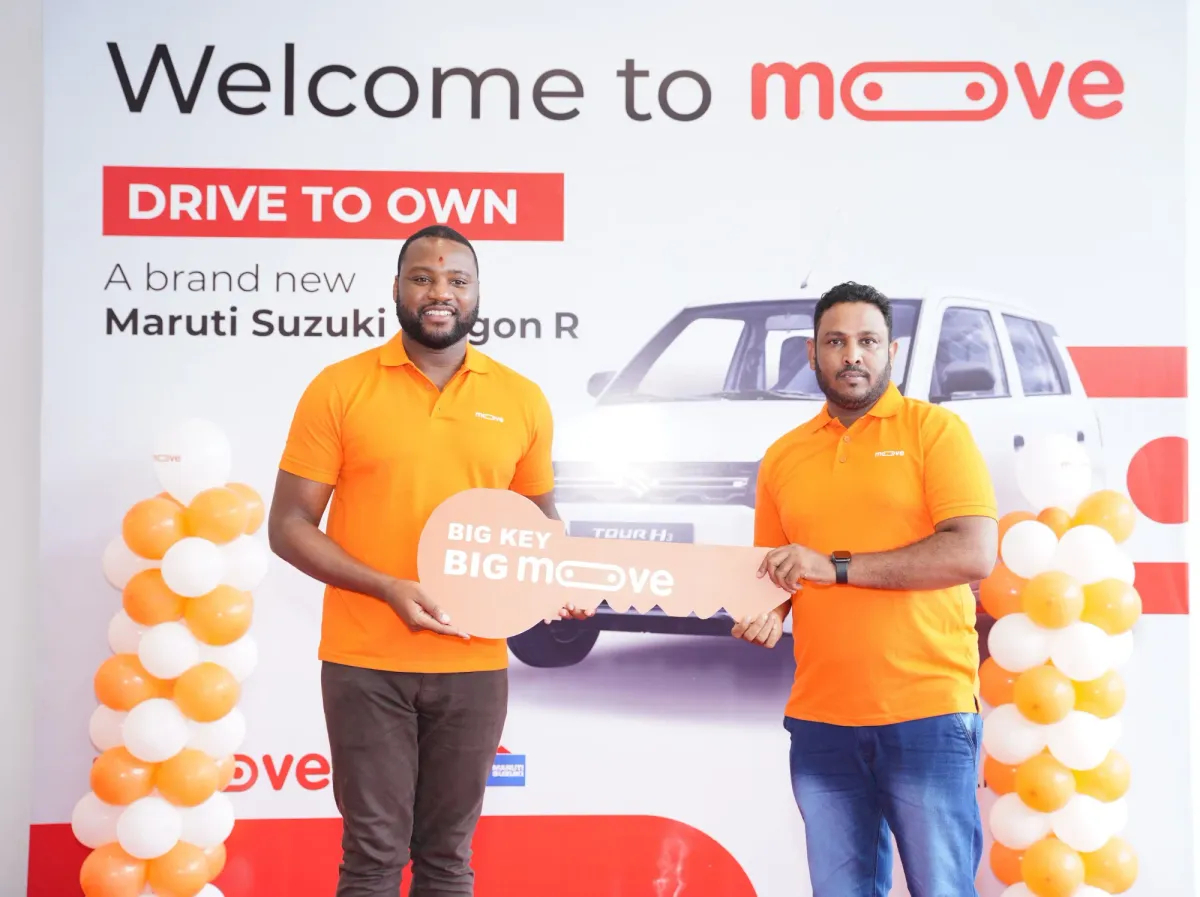Moove expansion to India, its first expansion outside of Africa, is part of its mission to close the finance gap for mobility entrepreneurs globally
Moove, the world's first mobility fintech, is venturing into India as part of its global expansion.
The African-born startup will provide vehicle financing to driver partners on Uber’s platform in three metros across India—Mumbai, Hyderabad, and Bangalore.
In a move set to be one of Uber India’s largest vehicle partnerships, Moove will launch 5,000 Electric Vehicle (EV) and Compressed Natural Gas (CNG) vehicles within the first year. The mobility fintech plans to scale to 30,000 over five years.
Founded in 2020, Moove provides revenue-based vehicle financing to mobility entrepreneurs. Using its alternative credit scoring technology it democratises access to vehicle ownership, creating sustainable employment opportunities to empower those previously excluded from financial services.
Since its launch, Moove has experienced 50% month-over-month growth since launch. To date, Moove-financed cars have completed over 6 million trips with over 30 million kilometres travelled across 6 markets which include Lagos, Accra, Johannesburg, Cape Town, Nairobi and Ibadan.
The startup has also raised over $200mn in debt and equity funding from various investors including NBK Capital Partners, Future Africa, British International Investment, Speedinvest, and Left Lane Capital. Moove has also partnered with CFAO Motors, Swvl and Uber.
Transforming mobility gig economies through vehicle finance
A recent survey revealed that nearly half of the world’s 1.1 billion gig workers are denied access to credit and financial services because traditional lending banks rely on historical data to underwrite their loans.
In emerging markets across Africa, Asia and MENA, poor credit penetration restricts millions of people from buying new vehicles. India has extremely low vehicle ownership with less than 25 per 1,000 people compared to Europe where it is 600+ per 1000 people.
The ‘mobility fintech sector is a white space created by Moove to democratise access to vehicle ownership. With this model, the startup is solving the challenge of limited access to vehicle financing for millions of people in emerging markets.
Moove leverages proprietary performance and revenue analytics to underwrite loans to customers who have previously been excluded from financial services. Over the past two years, mobility fintech has enabled sustainable job creation and a path to asset ownership with its customers having completed over 6 million trips in Moove-financed vehicles.
The company is now bringing its impact-led model to India, its first expansion outside of Africa, as part of its mission to close the finance gap for mobility entrepreneurs globally. Moove’s innovative model will help thousands of drivers return to work, by putting 5,000 vehicles on the road within the first year, with the intent of scaling to 30,000 vehicles and becoming Uber India’s mega-fleet partner across 300 cities over the next five years.
Tingting Peng, the Chief Capital, Strategy & Impact Officer at Moove, shared some insights with Benjamindada.com on mobility fintech’s expansion to India.
The expansion coincides with a time when the EVs and greener alternative fuel vehicle market are gaining popularity in the country. Peng revealed the market is set to grow due to the following reasons:
- Incentives from the Central and State governments such as improving renewable energy uptake and reducing harmful emissions by 2030.
- A combination of scale, technology and market maturity means battery pack prices may be set to decline in India making EVs more affordable.
- Leading OEMs in India are introducing EVs at scale by leveraging the robust local supply chain to meet the growing demand.
- India’s consumer readiness: increasingly people are ready to switch out of ICE vehicles for greener alternatives.
This creates the perfect market opportunity for Moove to provide accessible financing for fuel-efficient and electric vehicles.
Moove is the largest vehicle financing and supply partners for Uber across EMEA. The expansion into India is set to bolster this partnership.
The startup embeds its alternative credit scoring technology onto ride-hailing, e-logistics and instant delivery platforms. This helps to underwrite vehicle loans using proprietary performance and revenue analytics. Moove will also partner with local automotive companies in India.
Speaking on the launch into India Ladi Delano, co-founder and co-CEO at Moove, said, "As our first global expansion outside of Africa, launching in India is an extraordinary moment for the whole Moove team. We’re excited to be expanding our revenue-based vehicle financing model to enable the sustainable creation of jobs across the country, where there are some of the lowest vehicle ownership rates in the world, in part because of the lack of access to credit. We are delighted to be expanding our Uber partnership to solve this problem for our new customers in India."
Binod Mishra, Regional GM for South Asia at Moove, said, "We’re looking forward to working closely with the Uber India team to roll out Moove’s innovative platform, starting in Mumbai, Hyderabad and Bangalore, and scaling up to many more cities over the next five years."
The future of electric vehicles in sub–Saharan Africa
Transportation makes up to 10% of total greenhouse emissions in sub-Saharan Africa today. The greenhouse emissions are expected to more than double by 2040 as vehicle ownership increases.
Moove wants to be at the forefront of electrification and finance fit-for-purpose EVs in Africa. This will not only lead to a lowering of greenhouse emission reductions but have lower operational costs for customers to own. However, due to some challenges, the adoption of EVs has not kicked off fully.
Tingting Peng said, "Some of the core challenges we face in launching and scaling our EV offering in the region are the availability of charging and battery swapping infrastructure, and availability of affordable electric vehicles with local production or supply chains. To overcome these challenges we are actively pursuing partnerships with various stakeholders at every step of the EV value chain."







Comments ()